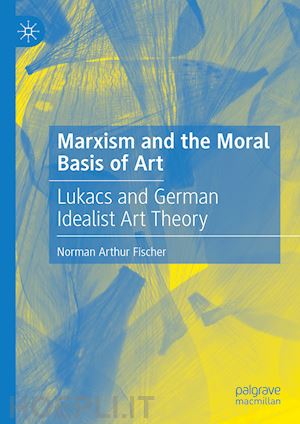

Questo prodotto usufruisce delle SPEDIZIONI GRATIS
selezionando l'opzione Corriere Veloce in fase di ordine.
Pagabile anche con Carta della cultura giovani e del merito, 18App Bonus Cultura e Carta del Docente
This book develops a moral Marxist aesthetics based on the work of Georg Lukács, Lucien Goldmann and Herbert Marcuse, and grounded in the aesthetic theories of German Idealist philosophers such as Hegel and Schiller. This moral-aesthetics takes three forms. The first is social and historical realism, as in Lukács and Goldmann. This is an aesthetics which fundamentally places the work of art within reality, particularly social and historical reality. The second aesthetics is utopian negation theory, and the third is formalism. The book pays special attention to Lukács’ concept of realistic historical novels, which he develops through the analysis of historical novels by Walter Scott, Honore de Balzac and Heinrich Mann. This theory of aesthetic realism is, as the book argues, grounded in Lukács’ reading of Hegel. The book concludes by offering fresh interpretations of the moral basis of Goldmann’s romantic realism in The Hidden God, and Marcuse’s emphasis on art as form and utopian negation of reality in The Aesthetic Dimension.
Chapter 1 Introduction.- Part I Georg Lukács’ Concept of Links between Ethics and Aesthetics in his 1933-1940 concept of Realistic Historical Novels.- Chapter 2 The Hegelian Ethical and Aesthetic Context of Lukács’ Concept of Historical and Social Aesthetic Realism.- Chapter 3 The Hegelian and Schillerian Context of Lukács’ Concept of Aesthetic Realism and Historical Novels about Class.- Chapter 4 The Hegelian Context of Lukács’ Concept of Aesthetic Realism and Historical Novels about Tyranny and Class.- Part II Romantic Marxist Art Theory’s use of Nineteenth Century Idealistic German Art Theory, Particularly Hegel’s and Schiller’s.- Chapter 5 Lucien Goldmann and Romantic Marxist Realistic Aesthetics.- Chapter 6 Herbert Marcuse and Romantic Marxist Negation and Formalist Aesthetics.
Norman Arthur Fischer was Professor of Philosophy from Kent State University until his retirement. Since then, he has been active as a public philosopher in his local community in Vermont.











Il sito utilizza cookie ed altri strumenti di tracciamento che raccolgono informazioni dal dispositivo dell’utente. Oltre ai cookie tecnici ed analitici aggregati, strettamente necessari per il funzionamento di questo sito web, previo consenso dell’utente possono essere installati cookie di profilazione e marketing e cookie dei social media. Cliccando su “Accetto tutti i cookie” saranno attivate tutte le categorie di cookie. Per accettare solo deterninate categorie di cookie, cliccare invece su “Impostazioni cookie”. Chiudendo il banner o continuando a navigare saranno installati solo cookie tecnici. Per maggiori dettagli, consultare la Cookie Policy.